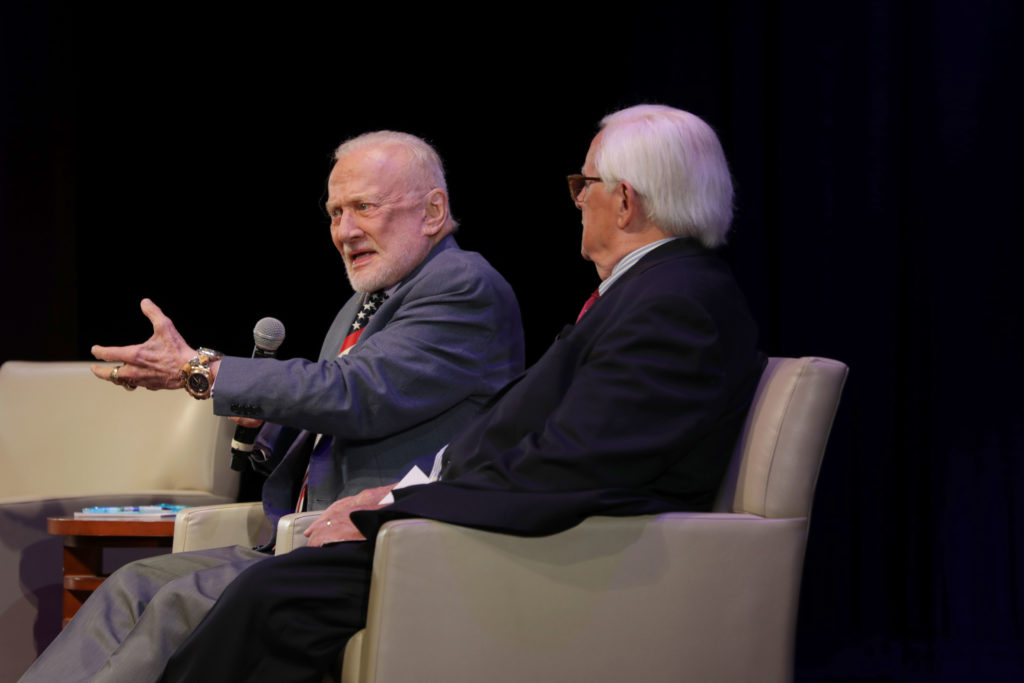About 1,500 people packed into Lisner Auditorium Thursday to celebrate the 50th anniversary of NASA’s Apollo 11 mission, the first manned spacecraft to land on the Moon.
Two astronauts on the Moon landing mission – Buzz Aldrin, one of the first two humans to step foot on the Moon, and Michael Collins, who piloted a command module in lunar orbit – joined professors and government officials on a panel to discuss space travel and U.S. foreign policy. The United States has relied on the symbolism of its space missions to make allies and maintain its status as a global superpower historically and continues to do so today, panelists said.
At the event, co-sponsored by the Elliott School of International Affairs’ Space Policy Institute, the Smithsonian’s National Air and Space Museum and the Department of State, experts reflected on the Apollo 11 Moon landing and discussed the present and future of space travel. In case you missed it, here are some highlights:
The Apollo 11 mission
The auditorium fell silent as Collins recalled his experience viewing all of the Earth from the window of the space shuttle.
“And out there, there’s this little pea about the size of your thumbnail at arm’s length – blue, white, very shiny,” he said. “You get the blue of the ocean, the white of the water and a streak of rust that we call the continents. It’s such a beautiful tiny thing, nestled in this black velvet of the rest of the universe. And that to me was the whole show.”
Collins said that if world leaders were able to see the Earth from so far away, it would remind them that borders and other differences between countries are small and insignificant. He added that the mission, an accomplishment for all of humanity, brought people around the world together.
“As you see this little thing, walking on it daily, is it fragile?” he said. “Oh lord, yes. Can some of those manifestations of fragility be corrected if we put our minds to it? Yes.”
Raising the next generation
Major General Charles Bolden, a former NASA administrator and a U.S. science envoy for space, said U.S. efforts to inform people around the world about the U.S. space program encourage other countries to move forward with space programs of their own. Bolden said kids especially learn by example and should be raised in a culture that values scientific inquiry.
“I think any kind of diplomacy is reaching out to as many people as you can and giving them a message of hope, give the message of importance and to let them know, to inform them of what there is to do,” he said.
Ellen Stofan, the director of the Smithsonian’s National Air and Space Museum, said museums and other programs that showcase space travel push more children into science, technology, engineering and mathematics, promoting “long-run” growth in developing nations.
The future of space travel
Aldrin, the astronaut who joined Neil Armstrong to walk on the Moon, closed the event as a surprise guest. He suggested that countries around the world form an international space alliance to increase the quantity of resources available for scientific achievement in space.
Aldrin also advocated for the construction of an Earth-orbiting space staging area from which space shuttles could launch, allowing astronauts to go on deep space missions. He said that while people may be disappointed that calls to return to the Moon and to bring humans to Mars have not been matched with action, an international alliance that includes private commercial space companies may be successful.
“Neil’s words were a small step and a giant leap,” he said, referencing his fellow astronaut’s first words on the Moon. “I think a number of us are still waiting for the leap.”





